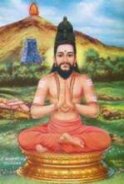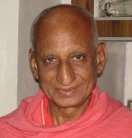

THE ESOTERIC
KANDAR ANUBHUTI
OR
THE SECRET TEACHING ON
GOD-EXPERIENCE
(A Treatise on Adwaitic Realization)
OF
SAINT ARUNAGIRINATHAR

 |  THE ESOTERIC KANDAR ANUBHUTI OR THE SECRET TEACHING ON GOD-EXPERIENCE (A Treatise on Adwaitic Realization) OF SAINT ARUNAGIRINATHAR |  |
 | by N.V. Karthikeyan |  |
| verses contents 26 27 28 29 30 31 32 33 34 35 .. 41 this verse in PDF version (4 parts) p-1 p-2 p-3 p-4 complete download of this book |
VERSE-31 பாழ்வாழ்வு எனுமிப் படுமாயையிலே வீழ்வாய்என என்னை விதித்தனையே தாழ்வானவை செய்தனதாம் உளவோ வாழ்வாய் இனி நீ மயில்வாகனனே.Paazh vaazhvu enumip padu-maayaiyile, Veezhvaai ena ennai vithitthanaiye Thaazhvaanavai seithanathaam ulavo, Vaazhvaai ini nee mayil vaaganane. Into this evanescent life of Maya perishable, Commentary The impact of that near Samadhi Experience (verse-28) was such that he could not forget it for a long time. The memory of it comes up again and again, but this time bringing him both remorse and joy -- remorse that the Lord has ordained him to fall once again in this meaningless life of Maya, and joy that he now knows why the Lord did so. Because he was unhappy with the Lord (almost blaming Him) for involving him into this life of Maya again (verse-29) after that grand experience (verse-28), the Lord revealed to him that He did so not because He wanted to do it but because of the seeker's some horrible karmas of the past yet remaining (as the Prarabdha/Sanchita Karmas) (verse-35). So, the seeker says: "O Lord! Are there some very, very despicable or mean (heinous) Karmas done by me in my previous births still in store!?" Of course, the answer 'yes' is implied in it. And for giving this clear understanding he is so happy that he also thanks, rather blesses, the Lord, saying 'Vaazhvaai' -- 'May You prosper and live long, O Peacock-Rider!' He is happy because, once you know the cause of suffering, it is undergone happily; and also it is easy to find a remedy for it. 'Padu Maayai'-'Perishable Maya': This seems to imply that the seeker is already foreseeing and confident of soon destroying the Maya which is perishable, by determined effort. Life on earth is not lasting. It comes and goes. It is evanescent. This life is as transitory as a dream. Things quickly vanish, leaving no trace of their existence, as in a dream. Hence, the phenomenal life is called Mayaic. Maya itself is perishable, i.e., is not a substantial, ever-lasting something. It is said to have no beginning but has an end; it ceases when one attains God. Arunagirinathar, therefore, refers to Maya as "Padu," (perishable). How evanescent, then, should be a world conjured up by this Maya, which itself is perishable? Yet, it is governed by exact, scientific laws - the most inexorable being the law of Karma. We inevitably reap the fruits of our past deeds; we are responsible for our happiness and suffering. There is no use blaming God or someone else for our present condition. If we suffer this misery of life in a sense-world, it is because we took it as real, wanted it, and hugged it, not knowing its illusory nature, and also forgetting God and His greatness. God does not put one into this Samsara wantonly out of hatred or prejudice. He neither hates nor loves anyone. He is the same to all. But, His divine law works so precisely that we are rewarded with the fruits of our actions. God is the dispenser of justice and He ordains each one to take birth in such circumstances as would be conducive for the working out of one's past Karmas. He, thus, paves the way for one's evolution, as no salvation is possible unless the Karmas are worked out. Are we not to be grateful to God for this kind act of His in providing us the necessary field in the form of this "transitory world" so that we may work out our Karmas and attain the Eternal Abode of Peace and Bliss? God has created an evanescent world, lest we should be pleased with it even if it be full of pain and suffering. The Gita says that this world is Anityam and Asukham; it is not merely painful (Asukham), it is non-lasting also, i.e., transitory (Anityam). Though painful, if it were still to be eternal, perhaps we might get attached to it and would like to live here itself permanently! If one dreams of having a vast treasure, perhaps he would like to perpetuate the dream and be a rich man even with the concomitant pains and anxieties. Hence it is that dreams are so construed as to last but for a moment; they are Anitya compared to waking. And this Mayaic life is so, compared to the waking of God-Consciousness. Hence, God has created an evanescent world conjured up by His Maya which is not lasting, and this He has done for our own good. Yet, in our ignorance we are accustomed to blame God for our birth and suffering in this world, saying, "O Lord, what a pity, You have ordained me to be born in this world and suffer!" But then there comes a time when we realise that not God but we are responsible for this and that there are past evil deeds of ours on account of which the Lord has made us born here, which is for our own ultimate good. Then it is that we begin to realise the greatness, mercy, and compassion of the Lord, when we cannot but feel grateful to Him and praise Him from the core of our being, "Lord, how compassionate art thou! How merciful art thou! May thou live long!" All this is so touchingly conveyed by Saint Arunagirinathar in this verse. We suffer because of our past deeds. If we resort to God, through singing His praise and glorification, we cross over His Maya and get freed from Samsara. The world-show is often compared to the play of hide-and-seek. The granny initiates the play and the children are subject to the laws of the play only so long as they enjoy the play and do not get tired of it. But the moment any child gets tired and comes back to the granny, he is freed at once from the play and its laws. So long as one takes life as real and enjoys it, one is involved in it. What can the Lord do for it? But getting tired with this Mayaic life, realising its utter essencelessness, if one resorts to the Lord, one's sufferings come to an end. To praise the Lord, to sing His glories, to do Japa, worship, meditation, etc., are the various means of resorting to the Lord to get freed from Samsara. "Due to my past deeds thou hast put me into this Samsara. But hereafter I will devote myself wholly to thy glorification only, O Peacock-rider. Live thou long!" "O Lord! Thou art Satchidananda, and that is enough for me; my little, passing world-experience of suffering and pain is nothing." - This underlying idea seems to be pulsating through the verse. Such moods can be had and maintained only in somewhat advanced stages. This is a peculiar state in which the seeker undergoes the bodily sufferings brought on him by his Karmas, but remains blissful within by maintaining the meditative consciousness by inner attunement with God through silent glorification. |
| contents 26 27 28 29 30 31 32 33 34 35 .. 41 this verse in PDF version (4 parts) p-1 p-2 p-3 p-4 |
| ... www.kaumaram.com ... The website for Lord Murugan and His Devotees முகப்பு கௌமாரம் அட்டவணை மேலே தேடல் home Kaumaram contents top search |
Kaumaram.com is a non-commercial website. This website is a dedication of Love for Lord Murugan. Please take note that Kaumaram.com DOES NOT solicit any funding, DIRECTLY or INDIRECTLY. |